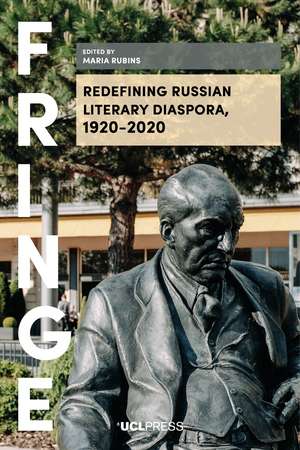Redefining Russian Literary Diaspora, 1920–2020: FRINGE
Editat de Maria Rubinsen Limba Engleză Hardback – 14 aug 2021
Since the start of the massive post-revolutionary exodus, Russian literature has thrived in multiple locations around the globe—but what happens to cultural vocabularies, politics of identity, literary canon, and language when writers transcend the metropolitan and national boundaries? This volume sets a new agenda for the study of Russian diaspora writing, reorienting the field from an excessive emphasis on the homeland to an analysis of transnational circulations that shape extraterritorial cultural practices. Integrating a variety of conceptual perspectives, ranging from diaspora and postcolonial studies to the theories of translation and self-translation, world literature, and evolutionary literary criticism, the contributors argue for a distinct nature of diasporic literary expression predicated on hybridity, ambivalence, and a sense of multiple belonging. As the complementary case studies demonstrate, diaspora narratives consistently recode historical memory, contest the mainstream discourses of Russianness, rewrite received cultural tropes, and explore topics that have remained marginal or taboo in the homeland.
Preț: 327.03 lei
Nou
Puncte Express: 491
Preț estimativ în valută:
62.58€ • 66.92$ • 52.18£
62.58€ • 66.92$ • 52.18£
Carte indisponibilă temporar
Doresc să fiu notificat când acest titlu va fi disponibil:
Se trimite...
Preluare comenzi: 021 569.72.76
Specificații
ISBN-13: 9781787359437
ISBN-10: 1787359433
Pagini: 278
Dimensiuni: 156 x 234 x 23 mm
Greutate: 0.57 kg
Editura: UCL Press
Colecția UCL Press
Seria FRINGE
ISBN-10: 1787359433
Pagini: 278
Dimensiuni: 156 x 234 x 23 mm
Greutate: 0.57 kg
Editura: UCL Press
Colecția UCL Press
Seria FRINGE
Notă biografică
Maria Rubins is a translator and professor of Russian and comparative literature at University College London. Her books include Crossroad of Arts, Crossroad of Cultures, and Russian Montparnasse.
Cuprins
Notes on contributors
Preface
Acknowledgements
Part one: Conceptual territories of ‘diaspora’: introduction
1. The unbearable lightness of being a diasporian: modes of writing and reading narratives of displacement
Maria Rubins
Part two: ‘Quest for significance’: performing diasporic Identities in transnational contexts
2. Exile as emotional, moral and ideological ambivalence: Nikolai Turgenev and the performance of political exile
Andreas Schonle
3. Rewriting the Russian literary tradition of prophecy in the diaspora: Bunin, Nabokov and Viacheslav Ivanov
Pamela Davidson
Part three: Evolutionary trajectories: adaptation, ‘Interbreeding’ and transcultural polyglossya
4. Translingual poetry and the boundaries of diaspora: the self-translations of Marina Tsvetaeva, Vladimir Nabokov and Joseph Brodsky
Adrian Wanner
5. Evolutionary biology and ‘writing the diaspora’: the cases of Theodosius Dobzhansky and Vladimir Nabokov
David Bethea
Part four: Imagined spaces of unity and difference
6. Repatriation of diasporic literature and the role of the poetry anthology in the construction of a diasporic canon
Katharine Hodgson
7. Is there room for diaspora literature in the internet age?
Mark Lipovetsky
8. The benefits of distance: extraterritoriality as cultural capital in the literary marketplace
Kevin M. F. Platt
Beyond diaspora? Brief remarks in lieu of an afterword
Galin Tihanov
Conclusion
Maria Rubins
Index
Preface
Acknowledgements
Part one: Conceptual territories of ‘diaspora’: introduction
1. The unbearable lightness of being a diasporian: modes of writing and reading narratives of displacement
Maria Rubins
Part two: ‘Quest for significance’: performing diasporic Identities in transnational contexts
2. Exile as emotional, moral and ideological ambivalence: Nikolai Turgenev and the performance of political exile
Andreas Schonle
3. Rewriting the Russian literary tradition of prophecy in the diaspora: Bunin, Nabokov and Viacheslav Ivanov
Pamela Davidson
Part three: Evolutionary trajectories: adaptation, ‘Interbreeding’ and transcultural polyglossya
4. Translingual poetry and the boundaries of diaspora: the self-translations of Marina Tsvetaeva, Vladimir Nabokov and Joseph Brodsky
Adrian Wanner
5. Evolutionary biology and ‘writing the diaspora’: the cases of Theodosius Dobzhansky and Vladimir Nabokov
David Bethea
Part four: Imagined spaces of unity and difference
6. Repatriation of diasporic literature and the role of the poetry anthology in the construction of a diasporic canon
Katharine Hodgson
7. Is there room for diaspora literature in the internet age?
Mark Lipovetsky
8. The benefits of distance: extraterritoriality as cultural capital in the literary marketplace
Kevin M. F. Platt
Beyond diaspora? Brief remarks in lieu of an afterword
Galin Tihanov
Conclusion
Maria Rubins
Index











